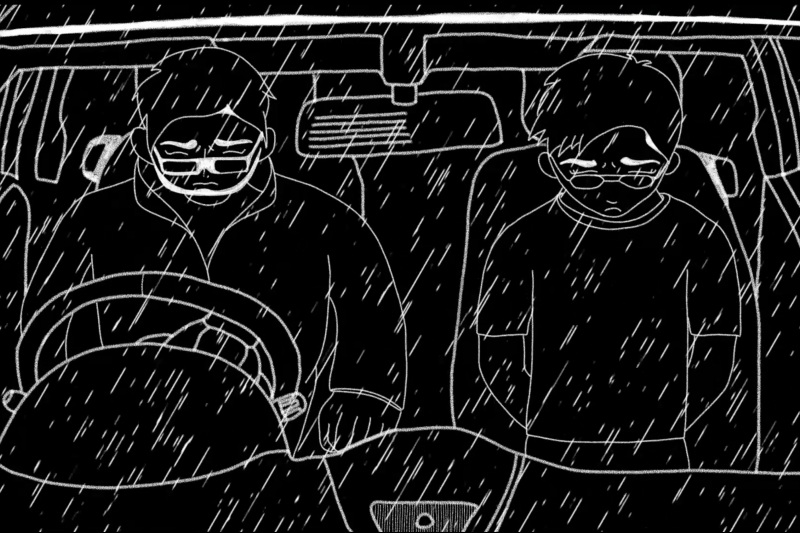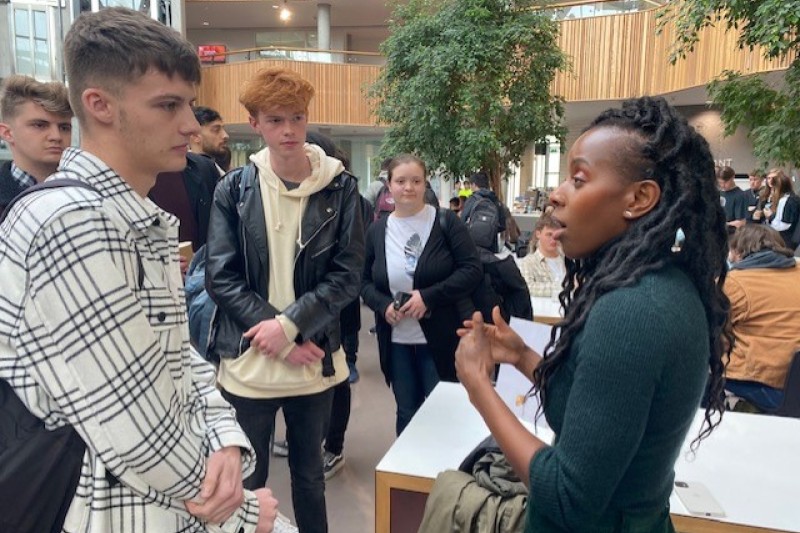Miles Green has had a long history at Bournemouth University, from his undergraduate course in Computer Animation and Visualisation (graduating in 2001) Miles got a job in the Media School as a demonstrator before completing his Master’s at BU. In 2004 Miles moved to Animal Logic in Australia, where he has gone on to work on popular animated films like Happy Feet and The Lego Movie. We caught up with him at the BFX Festival to hear more about his life and his current projects:
What sparked your move from Bournemouth University to Australia to work for Animal Logic?
We had an excellent guest lecturer in the Media School from ILM (George Lucas’ company) and he had just finished The Hulk and came over to a two-month sabbatical at the university. Luckily he was sat in the same room as me and Saf [Sofronis Efstathiou, who continues to work in the Media School] and we would pester him for a job at ILM – he looked at us strangely! We got on well and he looked at our technical work and six months later, after his sabbatical ended, we got an email from him saying ‘Hi, I’m at Animal Logic in Australia’. We knew a little bit about Animal Logic and I thought that it was probably one of the few places that I’d be prepared to move to from Bournemouth, because apparently it’s got great beaches and great weather! So he set up an interview and it went through and I progressed and moved into the FX department. To start with I was an FX Junior and he was my supervisor, that was for Happy Feet, and at the end of the project the work ran dry – there has not always been a huge industry in Australia so I came back [to the UK] to work at Framestore. There I worked on The Golden Compass but I was itching to get back to Australia. I liked London and it grew on me but the chance to go back was too strong. I had an offer to go and work for Rising Sun in Australia – when I got there I was immediately told that the work was delayed so I ended up working on The Spirit, Speed Racer and another low-budget movie called The Ruins and then Animal Logic were hiring up for their new work, which was Australia, they were just finishing up on the Nicolas Cage film The Knowing, and also Guardians of Ga’Hoole so I moved back to Animal Logic and I have been there ever since.
What have you been doing since then?
When I moved back [to Animal Logic] I went into a Lead role and very quickly an FX Supervisor role became available so I went in for that and I haven’t really looked back. I’ve been there, did Guardians [of Ga’Hoole] we did Walking with Dinosaurs, we did The Great Gatsby and we’ve just finished The Lego Movie, our most successful film. I love it! I became an Australian resident, I’ve got family – two young children. I’ve got a wonderful life in Australia but it’s still good to come back to where I came from [Bournemouth University] to see what has changed. Even today, at the BFX Festival, I have just bumped into loads of people, I know the people doing the talks, people at the events – some I used to work with, one was my old housemate – we are all connected, and best of all it is usually through Bournemouth! I can pick a company, any company, and I know two or three people there from Bournemouth University.
Journeying back, as a fresh-faced 18 year old starting at BU, did you think it would turn out like this?
Well, probably not actually! I think most people that start the course have a strong tie to either film or to computer games; they really want to go in one of those two directions. When I started the course I had just come off an art foundation course, I liked photography, pottery, crafting and sculpture, drawing and painting too. I was all about fine art and detail. Computers weren’t really my interest at that point but I visited a lot of fine art courses and from what I could see, everyone doing those courses was supporting their artwork by working in Tesco or just doing the run of the mill jobs, and I thought ‘I don’t want to do one of those sorts of jobs just so I can be an artist – I need to earn some money as well.’ Then a friend of a friend who had done the BU course a few years before said that the course was really artistic, really inspiring and that you get to make pictures, but the money can be quite good. So I started to look into it; it was early days in the computers – I never had a console as a kid – all my friends were into Nintendo and SNES but I was never into that. But my Dad did have a computer and I was starting to get the free floppy discs off the front of magazines and download early graphics programmes, early versions of Photoshop and Coral Paint and I remember thinking ‘this is really interesting, its art and its photo-real’. I actually really like photo-real – especially photo real drawing. So I came on the course and it took me in a completely different direction; I was all about drawing, painting and photography and suddenly I really quite liked the programming, creating computer games – I liked the process, and I still love the process. I actually don’t watch TV that much – people ask me if I’ve seen Gravity and I haven’t seen it yet – I don’t get a lot of chance to watch movies now I have children. Whenever we do go out to the cinema I just annoy my wife because she sits and really enjoys it while I sit and say, ‘I can tell that’s a smoke sim, that’s not real, that was done on a blue screen, the lighting isn’t right on that’ and she’ll tell me to shut up because I’m just ruining the film!! Honestly, if I’m going to watch a film I like getting involved in the story – if there are too much visual effects I will sit and analyse the effects. But it’s because I love the process – for me I love the challenge of creating something technical and difficult. If you take me back those 10-12 years I’d never thought I’d be doing this kind of role. Still people will say ‘this movie is so good’ or ‘this movie is X star’ but I don’t pay attention to that. It is all about the process and the detail.
So what does an FX Supervisor do?
So, in FX we are looking after and integrating natural phenomenon into a shot. So if it is a live action and there was a dinosaur – one of our big things before Lego was Walking With Dinosaurs – animation and modelling will have created the dinosaurs, they are walking through the forest, they’ve been textured and they are ready to be lit – but we have to integrate them. So if they are walking over pebbles then we will make the rocks move and crunch. If they are running around and hitting each other then we will do the breath coming out of their mouth – we are adding in those details and extra effects. If you think about something like MythBusters [the television series] those guys are from an FX background, they worked for George Lucas’ company creating practical effects. So they would have done flamethrowers for the backs of X Wings [Starfighters in the Star Wars films] – we are just the digital version of that. So if someone wants fire and flames its very expensive to employ a pyrotechnic and get him to find a flamethrower – it’s much cheaper and much more flexible for us to do it in a visual world, so fire, flame, oceans and waters – so if a creature is rising out of the sea we will create the sea and the water rolling off them. It’s very varied, that is what I like about the job; one day you will be doing some drool from a dinosaur’s tooth and the next day you will be doing a meteor hitting the earth with fire and explosion. Some of the other departments, like animation, you are always trying to make something come alive – in modelling they are always trying to make the best model or texturing to make something look photo-real, but in FX we might be doing the hologram for IronMan – it is really quite varied and different and we are really just trying to take those things and tie them into the environment.
What has your career highlight been so far – what is the first thing you always tell people?
As I’m not into film a lot people will find it impressive that I worked on films and say, ‘You worked on The Golden Compass’ and I’ll say, ‘Yes but the story wasn’t that great’. I love the effects on it and loved working on it but it is not a highlight. I would actually probably go for the most low-tech film I worked on, and that is The Lego Movie. I loved it because of the story! When it was in early-pitch phase we would say ‘this could go straight to DVD or it sounds a bit like a Barbie thing, how can we get people involved in Lego?’ But the story was just key to it – it made everything. My favourite comedy film is Zoolander and I thought Lego was the best mix; it is CG and it is funny and wacky – it is just different and that’s why I love The Lego Movie.
What words of wisdom do you have for students reading this now and want to become Miles Green in the future?
Choose what you want to be and stick to it! A lot of the time it can be a bit daunting to think about different specialties but pick a good course – like the one at Bournemouth University – because they will work with you and give you the right foundations – but that won’t get you all the way. It’ll take hard work, a real attention to detail, belief that you can do it. Try hard and you’ll definitely get there!



